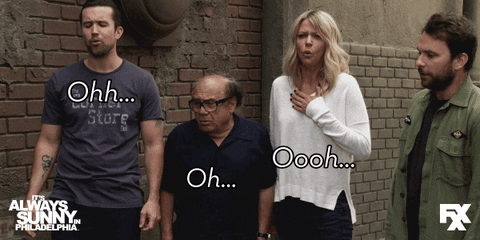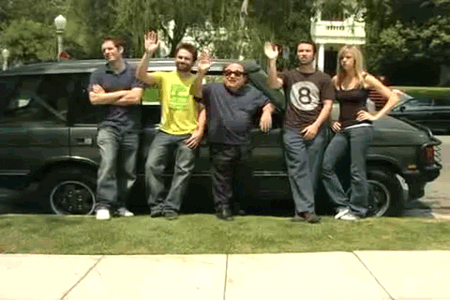
What if you combined:
The Running Man-esque gladiatorial combat as entertainment with some Battle Royale with some pro wrestling theatrical vibes sprinkled on top with some Naked and Afraid and light it all up?
You get Chain-Gang All-Stars, that’s what you get.
What if you combined:
The Running Man-esque gladiatorial combat as entertainment

with some Battle Royale

with some pro wrestling theatrical vibes sprinkled on top

with some Naked and Afraid

and light it all up?

You get Chain-Gang All-Stars, that’s what you get.
But, right underneath all that is an exploration of America’s prison-industrial complex and, more generally, its systematic oppression of marginalized people:

- The popularity of professional sports like American football in which people, especially black people, grieviously harm themselves for the American public’s viewing pleasure.
- The US’s prison-industrial complex that puts people, especially black people (are you seeing a pattern here?), behind bars and exists as a modern form of slavery which, like many things, further greases the wheels of capitalism.
- Systemic racism and how it undercuts/affects everything for people who aren’t white.
A lot of novels allow the reader to read the text and passively absorb any of the underlying political beliefs that the author has without questioning them too much. Chain-Gang All-Stars is NOT one of these kinds of novels. Everything is political but Chain-Gang All-Stars is aggressively so.
The text forces you to think about the topics mentioned above among others, in great detail, and it can be quite depressing. But the premise combined with its execution and the inspirations the text is pulling from act as a lubricant to provide the reader with both a very hard to put down read as well as some deeply upsetting knowledge about how the US oppresses marginalized people.
I was fully immersed in the world presented to me. Adjei-Brenyah’s depictions of these dystopian gladiator fights are written such that it’s easy to feel like a spectactor in the arena watching these fights from afar, cheering on your favorite contender and cringing when the fight gets bloody.
I felt like I could hear the crowd chanting all around me.
Mel—
Her left foot fell first, the midsole landed, and she rolled purposefully to her toes before pushing off again. Her body remembered, would always remember, how to run with purpose.
—an—
Again, her arms reversed themselves, slipping precisely past each other as her right leg rose and fell, her stride opening still. She was very close. She thought of nothing, put her trust in her body as it sped forward.
—cholia
Her arms switchbladed and her legs carried. She continued the push and switch of her arms and legs, forging speed. Her body told her, This speed, me, your body is your weapon.
As we get to know the gladiators more personally, what they have to go through to get where they are and why, it becomes harder to read these fights as unproblematic entertainment. It becomes clear that what these fights actually are, which is private capital funded public executions of society’s “undesirables” for profit.

Other than the initial premise, there’s a lot to love in Chain-Gang All-Stars, let’s talk about it.
Adjei-Brenyah is an expert at perspective shifting. The story is told from the perspective of many different characters and the way the narrative voice shifts between them is masterful. Initially, it’s unclear how all of these characters will fit into the larger narrative. Slowly figuring out how they would eventually collide was quite rewarding.
We still resting now. I lie down near enough to the others, fall on a bed of grass. The clothes I wear simple but clean. I used one of my murder points to have a brand I never heard of clean my clothes for me each week. Death becomes laundry. Death becomes food. Death the currency of everything if you let it. And they let it. But since it’s there I use it and I have a black shirt and pants to train in and sneakers that fit me and socks and underwear that all smell like pine and soap and the sweat of the March.
For a book that has so many characters in it, I’m surprised by how many of them I ended up caring about. Wil and Emily were a particular highlight for me; watching this couple live vicariously through the blood sport content they were consuming was a real pleasure.
“What the fuck just happened, babe? What the fuck just fucking happened. Oh my fucking God.” Emily had been bingeing recorded streams again. Wil had wanted to be there when she saw this part so she’d watched with him.
The novel has an early 2010s young adult framing that I associate with series like The Hunger Games, yet, the characters are all adults and the text is forcing you to come face to face with the grim reality of living as a marginalized person in the United States constantly.
It’s a vibe.
And, to be clear, there’s little to no escapism to find here if that’s what you’re looking for.
Despite writing a near future sci-fi text, Adjei-Brenyah keeps the reader grounded in the reality they live in by regularly presenting them with footnotes, contextually revealing real life statistics or stories about the US’s prison-industrial complex, sexual violence, etc. I’ve never seen footnotes used quite like this in any of the fiction I’ve read, it’s unique.
There’s a bed and a shit tin. Dark in here most of the day. But they glow in my brain. The hole is black. I only see when the door opens. The door opens one time a day. I sit, sleep, sing, flex, breathe, stretch, shake, cough, shit here. Here is where I come apart.[1]
1: Solitary confinement has been consistently found, nationally and internationally, to induce anxiety, paranoia, hallucinations, depression, panic attacks, memory loss, and other cognitive defects.
Footnotes are also used to provide poetic epitaphs for almost every person who dies. I thought this was a nice touch, giving Adjei-Brenyah the opportunity to pay respects to characters who’ve been killed and allow him to make these moments more impactful by reminding the reader of who these characters were and who they could have become if their lives weren’t cut short.
[…] Seen a lot. Done a lot. Found a home in the hell. She never sold poison to kids, but the poison found the kids anyways, so what was the difference? If you don’t have a code you have nothing, and […] had a code. You swing for your family, you hold your head high, you try to do right when you can. She didn’t think she was the love type. She was wrong about that. She found it in hell, a home with love and singing.
Chain-Gang All-Stars doesn’t provide the reader with all the answers they might be craving for by the end. There’s story threads that are left unwoven, but it feels like this was done intentionally. An ending that solved every problem presented in the novel would feel cheap and unearned.
There’s no easy solution to breaking down systems of oppression but with the right effort applied by the right people we can change the world and make it a better place to live in for all of us.
Chain-Gang All-Stars has got a lot of real depressing stuff in it but it’s also a hopeful story that’s about doing the best we can given the circumstances we’ve been forced into, it’s about found family, it’s about forgiveness and about loving yourself no matter what.
“I learned a long time ago. On this one thing you don’t negotiate. You love through all the people you’ve been and hope you have a chance at being better.” […] “What I’m telling you is you can curse yourself to the moon and back and what will it have you feeling like? But try to look at yourself and say ‘I love you’ and see what happens.”
It’s pretty good y’all.
